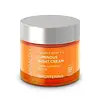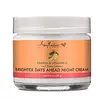What's inside
What's inside
 Key Ingredients
Key Ingredients

 Benefits
Benefits

 Concerns
Concerns

 Ingredients Side-by-side
Ingredients Side-by-side

Aloe Barbadensis Leaf Juice
Skin ConditioningWater
Skin ConditioningDicaprylyl Carbonate
EmollientLinum Usitatissimum Seed Oil
PerfumingCetyl Alcohol
EmollientStearyl Alcohol
EmollientEthylhexyl Palmitate
EmollientVaccinium Macrocarpon Fruit Juice
Skin ConditioningGlyceryl Stearate
EmollientMalus Domestica Fruit Cell Culture Extract
Skin ConditioningDaucus Carota Sativa Root Extract
Skin ConditioningSodium Hyaluronate
HumectantHelianthus Annuus Seed Oil
EmollientTheobroma Cacao Seed Butter
EmollientAllantoin
Skin ConditioningTocopherol
AntioxidantMagnesium Ascorbyl Phosphate
AntioxidantPersea Gratissima Oil
Skin ConditioningRosa Canina Fruit Oil
EmollientOenothera Biennis Oil
EmollientSqualane
EmollientCamellia Sinensis Leaf Extract
AntimicrobialRiboflavin
Cosmetic ColorantPhenethyl Alcohol
MaskingEthylhexylglycerin
Skin ConditioningRubus Idaeus Fruit
AstringentEthyl Vanillate
PerfumingCitrus Aurantium Dulcis Peel Oil
MaskingAloe Barbadensis Leaf Juice, Water, Dicaprylyl Carbonate, Linum Usitatissimum Seed Oil, Cetyl Alcohol, Stearyl Alcohol, Ethylhexyl Palmitate, Vaccinium Macrocarpon Fruit Juice, Glyceryl Stearate, Malus Domestica Fruit Cell Culture Extract, Daucus Carota Sativa Root Extract, Sodium Hyaluronate, Helianthus Annuus Seed Oil, Theobroma Cacao Seed Butter, Allantoin, Tocopherol, Magnesium Ascorbyl Phosphate, Persea Gratissima Oil, Rosa Canina Fruit Oil, Oenothera Biennis Oil, Squalane, Camellia Sinensis Leaf Extract, Riboflavin, Phenethyl Alcohol, Ethylhexylglycerin, Rubus Idaeus Fruit, Ethyl Vanillate, Citrus Aurantium Dulcis Peel Oil
Water
Skin ConditioningCaprylic/Capric Triglyceride
MaskingGlycerin
HumectantCoco-Caprylate/Caprate
EmollientCetyl Alcohol
EmollientCetearyl Olivate
Butyrospermum Parkii Butter
Skin ConditioningSorbitan Olivate
EmulsifyingStearyl Alcohol
EmollientGlyceryl Stearate Citrate
EmollientCetearyl Alcohol
EmollientRicinus Communis Seed Oil
MaskingHydrogenated Vegetable Oil
EmollientCitrus Aurantium Dulcis Peel Oil
MaskingAscorbic Acid
AntioxidantCarica Papaya Fruit Extract
Skin ConditioningCitrus Junos Fruit Extract
Skin ConditioningLactic Acid
BufferingSodium Hyaluronate
HumectantTocopherol
AntioxidantAllantoin
Skin ConditioningSodium PCA
HumectantHydroxyproline
Skin ConditioningProline
Skin ConditioningPanthenol
Skin ConditioningSodium Starch Octenylsuccinate
AbsorbentGlycine Soja Oil
EmollientSilica
AbrasiveEthylhexylglycerin
Skin ConditioningXanthan Gum
EmulsifyingGlyceryl Caprylate
EmollientTriethyl Citrate
MaskingBenzoic Acid
MaskingPhenoxyethanol
PreservativeWater, Caprylic/Capric Triglyceride, Glycerin, Coco-Caprylate/Caprate, Cetyl Alcohol, Cetearyl Olivate, Butyrospermum Parkii Butter, Sorbitan Olivate, Stearyl Alcohol, Glyceryl Stearate Citrate, Cetearyl Alcohol, Ricinus Communis Seed Oil, Hydrogenated Vegetable Oil, Citrus Aurantium Dulcis Peel Oil, Ascorbic Acid, Carica Papaya Fruit Extract, Citrus Junos Fruit Extract, Lactic Acid, Sodium Hyaluronate, Tocopherol, Allantoin, Sodium PCA, Hydroxyproline, Proline, Panthenol, Sodium Starch Octenylsuccinate, Glycine Soja Oil, Silica, Ethylhexylglycerin, Xanthan Gum, Glyceryl Caprylate, Triethyl Citrate, Benzoic Acid, Phenoxyethanol
Ingredients Explained
These ingredients are found in both products.
Ingredients higher up in an ingredient list are typically present in a larger amount.
Allantoin is a soothing ingredient known for its protective and moisturizingg properties. Because of this, it is often added to products with strong active ingredients.
Studies show higher concentrations of this ingredient can promote wound healing.
Though it can be derived from the comfrey plant, allantoin is produced synthetically for cosmetic products to ensure purity.
Learn more about AllantoinCetyl Alcohol is a fatty alcohol. Fatty Alcohols are most often used as an emollient or to thicken a product.
Its main roles are:
Though it has "alcohol" in the name, it is not related to denatured alcohol or ethyl alcohol.
The FDA allows products labeled "alcohol-free" to have fatty alcohols.
Learn more about Cetyl AlcoholCitrus Aurantium Dulcis Peel Oil is oil from the peel of an orange fruit.
Limonene and linalool make up the majority of oils from citrus peels. Limonene has a "citrus" fragrance. Citrus peels also contain flavonoids, which have anti-inflammatory properties.
Citrus peel is also a rich source of flavonoids. Flavonoids are natural antioxidants and help protect your skin against damage. Flavonoids are a group of compounds naturally found in vegetables and fruits.
The term 'fragrance' is not regulated in many countries. In many cases, it is up to the brand to define this term. For instance, many brands choose to label themselves as "fragrance-free" because they are not using synthetic fragrances. However, their products may still contain ingredients such as essential oils that are considered a fragrance.
Learn more about Citrus Aurantium Dulcis Peel OilEthylhexylglycerin (we can't pronounce this either) is commonly used as a preservative and skin softener. It is derived from glyceryl.
You might see Ethylhexylglycerin often paired with other preservatives such as phenoxyethanol. Ethylhexylglycerin has been found to increase the effectiveness of these other preservatives.
Sodium Hyaluronate is hyaluronic acid's salt form. It is commonly derived from the sodium salt of hyaluronic acid.
Like hyaluronic acid, it is great at holding water and acts as a humectant. This makes it a great skin hydrating ingredient.
Sodium Hyaluronate is naturally occurring in our bodies and is mostly found in eye fluid and joints.
These are some other common types of Hyaluronic Acid:
Learn more about Sodium HyaluronateStearyl Alcohol is a type of fatty alcohol from stearic acid. It is a white, waxy compound used to emulsify ingredients.
Fatty Alcohols are most often used as an emollient or to thicken a product. Emollients help soothe and hydrate the skin by trapping moisture.
They are usually derived from natural fats and oils and therefore do not have the same drying or irritating effect as solvent alcohols. FDA allows products labeled "alcohol-free" to have fatty alcohols.
Learn more about Stearyl AlcoholTocopherol (also known as Vitamin E) is a common antioxidant used to help protect the skin from free-radicals and strengthen the skin barrier. It's also fat soluble - this means our skin is great at absorbing it.
Vitamin E also helps keep your natural skin lipids healthy. Your lipid skin barrier naturally consists of lipids, ceramides, and fatty acids. Vitamin E offers extra protection for your skin’s lipid barrier, keeping your skin healthy and nourished.
Another benefit is a bit of UV protection. Vitamin E helps reduce the damage caused by UVB rays. (It should not replace your sunscreen). Combining it with Vitamin C can decrease sunburned cells and hyperpigmentation after UV exposure.
You might have noticed Vitamin E + C often paired together. This is because it is great at stabilizing Vitamin C. Using the two together helps increase the effectiveness of both ingredients.
There are often claims that Vitamin E can reduce/prevent scarring, but these claims haven't been confirmed by scientific research.
Learn more about TocopherolWater. It's the most common cosmetic ingredient of all. You'll usually see it at the top of ingredient lists, meaning that it makes up the largest part of the product.
So why is it so popular? Water most often acts as a solvent - this means that it helps dissolve other ingredients into the formulation.
You'll also recognize water as that liquid we all need to stay alive. If you see this, drink a glass of water. Stay hydrated!
Learn more about Water